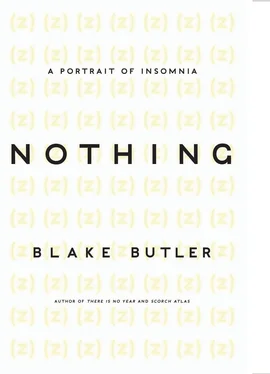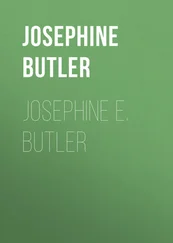]
]
]
Turning over on the bed to again lay on my other side I search again for the station where my head fits best in the pillow’s folds. I flip the pillow over to make it cold. No matter how comfortably the pillow and surrounding blankets fit my head at first I’ll always again have to tinker as the condition settles and becomes less new — it might take three or four or seven or eight adjustments of the blanket and the pillow in cohesion to form a set of vertices at which I feel most settled in each iteration of the turn, then my legs and arms will have to be right again too. I need my feet sticking out from underneath the far end of the blanket just enough to cool the rest of my body off, but not so much that they are cold themselves, also the blanket has to fall on them in the right way, did I already say this? I know I’ve said this. I’ve said it all so many times, so much inside my head it becomes hard to tell what is the word in welling and what is nowhere and who I ever am. I always have to start over — to reset myself, finding some pattern or progression — though the selves inside the self are all right there — they may go silent, they could fry out, entering hiding — and yet they are in there. There they are. And just beyond the rim of flesh of my own body, too, the reams of others there in concert, rerepeating, held inside their own skulls with their own endless music, silent from here, but alive. Each one’s own mind’s squirm one of billions, folding in a churn:
Average number of thoughts per waking second: 10.
Therefore, per hour: 36,000.
While one is sleeping, the rate moves a decimal to the left.
Therefore, per day, per human: 604,800 thoughts.
Current estimated world population: 6,446,131,400 folks.
Therefore, per day, our sum output: 3,898,620,270,700,000 human thoughts.
And so here appears another night inside another ream of what. With or without your will, it waddles on. The more you try to stop, the more it’s screaming. Each night, we work our way toward a sleeping’s pausing hole. By the time I’ve found a comfort space inside the restart of my fidget, I’ll likely have been tossing for eight to eighteen minutes, maybe longer, though I don’t want to check the clock again, as that would reset the mode another time, and in seeing what I’ve seen I might find it’s indeed even longer and in not looking I can imagine it’s been hardly any time at all, though every minute sometimes seems ten minutes and sitting up will lose the progress I’ve made inside my skin, and if I have not begun to annoy her in the bed beside me in her own sleeping then moving more will surely do it and then I’ve inflicted my stupid night parade on her, and maybe I have already, I must, I at the very least have begun to worry that I have, and what replication of this shitstorm in another body might birth from mine and therein spread in magnet systems, infecting her not only with private complications, but so too in reflection against my own, a teeming network that in the worst modes can infect a whole home’s air and emotional operation within, and in the cleanest maybe just be something more for me to spin and shit around with overanalyzing every inch, so I begin trying to limit my reactions to the ways I have not situated myself rightly in the meantime, and I begin to try to force myself to calm, to demand the calm this time by truly calming, becoming flatter, letting the air out of my mind, my body this time truly centered in a sinking and no sirens, but most often I am not in the correct position, and the longer I wait trying to be calm the less calm I am. Some nights it is better then to get out of the bed and walk around as if the day is there and let the selves sit and think of other words.
At certain times throughout the day, inside the stilling, that warm hand of the sleepmode coming up from in my mud, I might lie down on a sofa or a floor and fall into the blank without even nodding. It strikes sometimes as if infected, in a cloud. Even during my worst periods of evening insomnia, there are times I could fall into modes or against certain surfaces and go out in the loud light of the day, sleeping instantaneously, hard and with total absence, for several hours, sleeping the sleep of underground, waking later in the room in just as quick an instant, thinking nothing, disremembered of how I ever fell into such a perfect hole. This phenomenon is common — the texture of cartoon. In the 1953 Disney film How to Sleep , man-dog Goofy finds himself nodding out everywhere — work, while walking — excerpt when in his bed, causing him to lose his job and dream while waking.57 In his diaries, Andy Warhol mentions nodding off in the bathtub while in his bed he cannot sleep — the water, in some way, like a second body enveloping the skin sacs and the spine — a rewinder — the unconscious threat of accidental death from perhaps slipping underneath the warming lip. In the same breath, in that flat tone, Warhol mentions rereading a passage in a book where Jackson Pollock rams himself and his lover dead in their car into a tree. Warhol’s creative body’s apparatus in the same way lurks restlessly, somnambulating shut off, operated by appendages of no definite will, creating replication of a nothing in which human error leaks and is smeared over and is still there and never not alive despite its tacit, intentionally reflective sphere — each hour gloaming in the presence of the nothing, another contribution to the orb of light and sounds and hours pulling on the body from the outside by simply being, gathering around the blip. Even in full-on seeming waking, the body wants constantly to see blank: the average person blinks 17,000 to 22,000 times per day, each blink lasting 300 to 400 milliseconds, which means, on average, we spend nearly 114 minutes of each day unseeing and awake — a black rind over variation of the daily light, a lidless partition, undreamed.
Regardless, in this bed-mode, surrounded by such states, in want of some kind of recognizable evening routine — and knowing too that in expectation of that incidental nod-off it will almost always never work — the designated sleep space often becomes alter-charged, looming with its years of shaking every evening regardless of how gone. In bed, after the combination, I will flip back and forth from side to side and on my back and at some point onto my chest, a necessary cycle in the spinning though I never fall sleep on my chest and any time spent that way is just more time circled, though I still usually at least have to test the position each night at least for a few minutes, all positions must be tested, all limbs adjusted in their minor manners unto each set of new vortices and folds, and meanwhile, inside, my brain rolled on again for its own stable condition therein floating in the void wherein my center’s hid, the brain inside my brain knowing that by now it is at the very least 3:30, which is thirty minutes from the last time that I thought about the time, and thirty minutes less now even from the time I’ll have to do anything tomorrow, less still from what I had when I thought about it last, and it’s probably later than that already really, which means tomorrow is already even worse and quickly ending before it’s even started and I still am nowhere near to sleep.
By the end, most nights, in my attempts at locating the drift position, I finalize turned up flat on my back, though I will most often wind up turning again onto my left side before actually sleeping, the final click into the lock. This interim on-my-back period is a good period when I find it, as in it, post-commotion, I actually will begin to find the first kernels of the nothing , the true nothing in which there is a silence, and in which one of the remaining doors leads into sleep. Beginning on the back, though, rarely works right: part of its feeling right, nightly, is the unfurling, the sprawl. Each night I still must find the door to sleep among the other doors remaining, the doors which lead back into more recursive thought, though at least knowing that the sleep door is there and potentially ready to be opened brings some rhythm to my pause — a series of infinite undoings, rebecomings, so Thomas Bernhard: “We’re constantly correcting, and correcting ourselves, most rigorously, because we recognize at every moment that we did it all wrong (wrote it, thought it, made it all wrong), acted all wrong, how we acted all wrong, that everything to this point in time is a falsification, so we correct this falsification, and then we again correct the correction of this falsification and we correct the result of the correction of a correction andsoforth.”
Читать дальше












